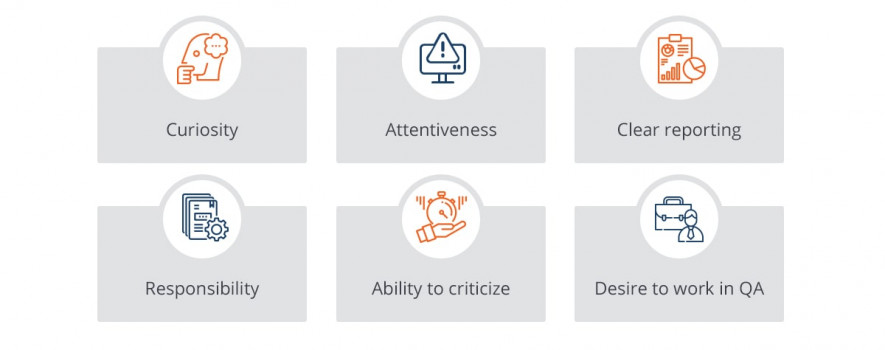Advices How to Find Exceptional QA Tester
by Vadym Yudovych | May 28, 2019 8:40 am
Each project manager knows how important it is to choose the right team member. There is no room for a mistake here. But how to choose a tester? What is the best way to do this? You will not meet the candidate with a Degree in QA. Even if a person has some experience in testing, how to recognize him out of the majority? How to be sure that your tester is exceptional? Here QATestLab blog shares expert advices what tips to follow to build a path to your perfect tester.
The main element in the recruitment of QA specialists[1] is relevant experience. Here we talk mostly about the technical aspect and ability to use different tools and to act in different environments. Let’s focus on the most widespread requirements towards QA testers in the course of technical experience. The average junior/senior QA[2] engineer is expected to possess the following skills:
- basic knowledge of HTML / CSS, JavaScript;
- confident understanding of how the web works (HTTP / HTTPS, TCP / IP, HTML);
- experience with debugging tools: Chrome DevTools, Firebug, Postman, Safari dev tools, etc;
- test execution and bug reporting experience;
- participation in the analysis and diagnosis of regular system regression tests;
- agile dev process experience;
- experience in automation tools.
The requirements for team leader[3] and project manager include the following skills:
- cooperation with development and integration team to monitor bug resolution;
- coordination of a team in the course of task completion;
- adjusting of teamwork, division of duties and monitoring of workloads.requireme
What soft skills are required?
It would be very simple if the choice of a tester required only technical background in software testing. Even if the candidate is professionally strong, it is not enough to call him exceptional. The future employee has to prove that he is valuable not only because of wide experience but by representation of his soft skills and personal qualities too.

Curiosity is the basic property that any tester needs. A tester without curiosity will not be able to adequately test any system[4].
Attentiveness and perseverance. Usually, our testers notice everything around, even if they are not looking at you but at the monitor of their screen. Only an assiduous person will be ready to go through the same level in the game dozens of times or go through dozens of checklists.
The ability to simply and clearly describe the detected bugs. A tester must clearly formulate his report in a logical and structured manner, and be able to explain the error in clear words for everyone: both for the developer and the user.
Sense of responsibility. The tester must understand that the final feedback of the user will depend on how he checks this or that application, and how this affects the customer’s profit and even the brand if the product is widely known.
Ability to criticize (constructively). The tester’s brain is designed to break something, change, improve, and for this, you need to bring constructive criticism to the developer or customer of a product.
Desire to work in QA sphere which includes:
- readiness for non-stop learning;
- willingness to help your job-neighbor;
- proactivity;
- openness and honesty;
- perfectionism;
- ability to defend their point of view;
- light in the eyes.
How do we recognize an exceptional tester?
HR can easily understand whether a person has the necessary qualities. You just need to observe his behavior at the interview – what questions does the person ask during the interview and whether he asks questions at all. To find out if a person is attentive, you need to give him a test assignment to check how good he is in bug detection.
The ability to clearly describe the bugs is checked this way: you need to ask the candidate to write a typical, in his opinion, error message. All the skills of the candidate will manifest in what he will write.
The ability to criticize is checked simply enough: a person is asked to comment on the quality or usability of a site or game, or simply to give an assessment of a product that has low quality.
To Sum Up
We regard the selection of personnel in the company as the collection of one big puzzle, which consists of equally relevant parts – our employees. Not every piece comes up to this puzzle, but when it happens, a harmony comes. Each company has its own traditions that have taken root year after year. The team and the personal qualities of everyone in it are very important, so it is always right to share knowledge if we see that a person deserves the hiring. In QATestLab we know how to recognize a truly talented member, and we are happy to help you find your own exceptional tester.
Learn more from QATestLab
Related Posts:
- recruitment of QA specialists: https://blog.qatestlab.com/2018/12/03/applicant-tracking-systems/
- senior QA: https://blog.qatestlab.com/2017/03/27/senior-qa-engineer/
- requirements for team leader: https://blog.qatestlab.com/2019/04/25/qa-leads-responsibilities/
- test any system: https://qatestlab.com/services/
- PM, POM, Project Manager, QA Lead, Team Lead: Who are all these people?: https://blog.qatestlab.com/2020/01/22/pm-pom-qalead/
- Practical tips for PM: How to build a QA Dream Team: https://blog.qatestlab.com/2019/10/22/build-qa-team/
- Top 10 Tools for Effective Project Management: https://blog.qatestlab.com/2019/10/03/top-project-management-tools/
Source URL: https://blog.qatestlab.com/2019/05/28/exceptional-qa-tester/

